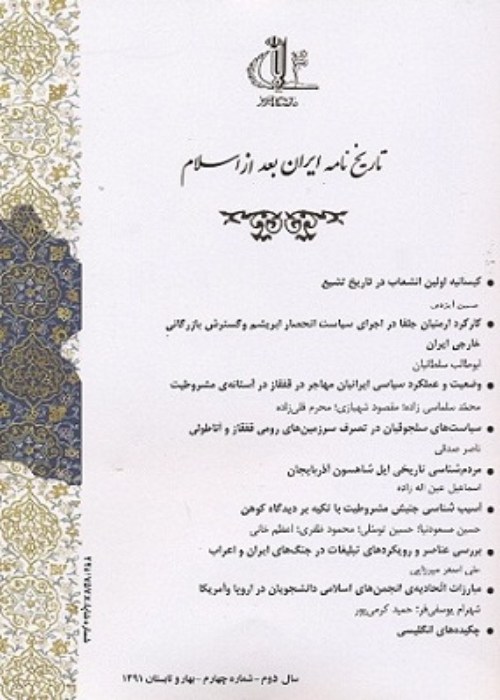Khajeh Nasir al-Din Tusi, the Guide of the Mongol Ilkhans towards Iranian and Islamic Civilization (Based on the Writings of Khajeh Nasir)
Author(s):
Article Type:
Research/Original Article (دارای رتبه معتبر)
Abstract:
From the time of the Mongol invasion of the Ismaili castles to the present day, one of the points of concern for many people has been the reason for Khajeh Nasir al-Din al-Tusi's collaboration with prominent Muslim scholars and non-Muslim Mongols. Many have accounted Khajeh’s political behavior during the rule of Ilkhanate as his hostility towards denominations and the Sunnis. Many others have known it as part of his opportunistic character and claimed that he has done so to achieve a certain political status. However, by carefully studying the works of Khajeh, one could find other logical and fundamental reasons for Khajeh’s behaviors that unfortunately have been mostly disregarded. By reading his works, many Islamic legal, historical, psychological, philosophical, and other kinds of reasons can be found that deserve paying attention. Khajeh’s prominent personality trait is related to philosophy and Kalaam (scholastic theology); hence, it only makes sense to seek the reason behind this collaboration in Khajeh’s frame of thought. Khajeh’s most important work in this area is Akhlaaq e Naasiri, in which the most important topic is Madina Faazila. From the time of the Mongol invasion of the Ismaili castles to the present day, one of the points of concern for many people has been the reason for Khajeh Nasir al-Din al-Tusi's collaboration with prominent Muslim scholars and non-Muslim Mongols. Many have accounted Khajeh’s political behavior during the rule of Ilkhanate as his hostility towards denominations and the Sunnis. Many others have known it as part of his opportunistic character and claimed that he has done so to achieve a certain political status. However, by carefully studying the works of Khajeh, one could find other logical and fundamental reasons for Khajeh’s behaviors that unfortunately have been mostly disregarded. By reading his works, many Islamic legal, historical, psychological, philosophical, and other kinds of reasons can be found that deserve paying attention. Khajeh’s prominent personality trait is related to philosophy and Kalaam (scholastic theology); hence, it only makes sense to seek the reason behind this collaboration in Khajeh’s frame of thought. Khajeh’s most important work in this area is Akhlaaq e Naasiri, in which the most important topic is Madina Faazila.
Keywords:
Language:
English
Published:
Journal of Iranian Islamic Period History, Volume:12 Issue: 27, Summer 2021
Pages:
65 to 77
magiran.com/p2340928
دانلود و مطالعه متن این مقاله با یکی از روشهای زیر امکان پذیر است:
اشتراک شخصی
با عضویت و پرداخت آنلاین حق اشتراک یکساله به مبلغ 1,390,000ريال میتوانید 70 عنوان مطلب دانلود کنید!
اشتراک سازمانی
به کتابخانه دانشگاه یا محل کار خود پیشنهاد کنید تا اشتراک سازمانی این پایگاه را برای دسترسی نامحدود همه کاربران به متن مطالب تهیه نمایند!
توجه!
- حق عضویت دریافتی صرف حمایت از نشریات عضو و نگهداری، تکمیل و توسعه مگیران میشود.
- پرداخت حق اشتراک و دانلود مقالات اجازه بازنشر آن در سایر رسانههای چاپی و دیجیتال را به کاربر نمیدهد.
In order to view content subscription is required
Personal subscription
Subscribe magiran.com for 70 € euros via PayPal and download 70 articles during a year.
Organization subscription
Please contact us to subscribe your university or library for unlimited access!



